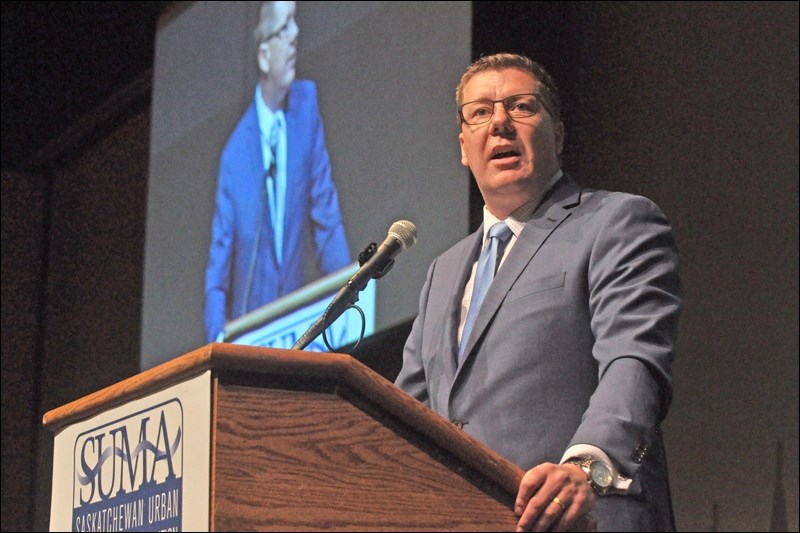SASKATOON - A much-anticipated change in the municipal revenue sharing formula between the provinces and municipalities has been announced.
Premier Scott Moe announced at the Saskatchewan Urban Municipalities Convention on Monday that the new formula will be set at three-quarters of one point of Provincial Sales Tax.
For municipalities, overall revenue sharing will rise from $241 million to $251 million, or a four per cent increase.
Previously, the formula was set at one per cent of PST. However, with the PST being expanded to include construction and restaurant meals, and with more revenue coming in to the province from that tax as a result, a new formula was needed.
“The changes we had announced in the year previous to the PST, announced in 2017, meant the formula needed to be redeveloped, had to be modified,” Moe told the SUMA delegates at TCU Place in Saskatoon.
He said all parties wanted to preserve the two qualities of the previous formula that it be “predictable and transparent.”
The province froze funding last year to municipalities at $241 million while they worked with the municipalities on a new formula. Both SUMA and SARM, the Saskatchewan Association of Rural Municipalities, were involved in the negotiations.
“Tying the formula to PST was desirable to both SUMA and SARM,” Moe said in a news conference interview with reporters. He added this “gives them that sustainability and transparency and predictability into the future.”
It is unclear yet what this will mean in terms of actual money coming to the City of North Battleford and the Town of Battleford. Mayor Ames Leslie of Battleford suggested there could be less money coming to the town under the new formula.
“It is not very attractive – 75 per cent of one point,” said Leslie.
“It will be interesting to see when we get back and run some numbers with our finance department what it will mean to the taxpayers of the town of Battleford, but quick math suggests it’s probably less funding than what we’ve been getting in the years past.”
Far less impressed was opposition leader Ryan Meili.
“This is a minor increase, that’s welcome, but it won’t make most communities whole based on previous cuts and increased cost,” said Meili to reporters.
Meili also continued to hammer the expanded PST on construction and restaurant meals. He also said the new revenue sharing formula “locks us into that expanded PST that has caused a significant number of problems.”
Meili called the PST on construction a “major detriment to the construction industry” and made municipal projects “much more expensive, much more difficult for municipalities to get into.” He told reporters he preferred taking the PST off construction and restaurant meals and leaving the formula at one point of PST.
The big city mayors, however, seemed happy with the announcement.
“We’re pleased,” said Mayor Michael Fougere of Regina. “There’s a quantum of 10 million dollars above the freeze they had on, it’s good news for the cities and towns and villages right across the province. So it’s good news.”
“I would say, given the state of the economy and the budget that we’re looking at, it’s a good step forward,” said Mayor Charlie Clark of Saskatoon. “It recognizes a strong relationship and a role that municipalities play and the importance that revenue sharing plays in helping us build our economies. I think they listened to a lot of the consultations.”
Clark also pledged every dollar his city received from revenue sharing “would be put to good use” and said “there’s a lot of pressures on us to keep up with the demand.”
“It’s nice to have an additional 10 million dollars added to revenue sharing,” was the reaction from SUMA President Gordon Barnhart. Barnhart was also pleased the formula continued to be tied to PST, and appreciated that the revenue sharing was “unfettered – it’s up to the communities as to how it is spent.”
In other remarks from his address to delegates, Moe also announced the provincial budget will be released March 20, and “it will be a balanced budget,” he said.
This is the third year of the three-year plan to balance the budget. That plan is on track but Moe said “to reach that goal we made some very challenging decisions.”
While municipalities will see a four per cent increase, “many organizations are not going to see a similar boost in their funding from the province this year. Make no mistake, this will be another tight budget.”
Moe also took time in his address to hammer the federal government on their plans to impose a carbon tax.



